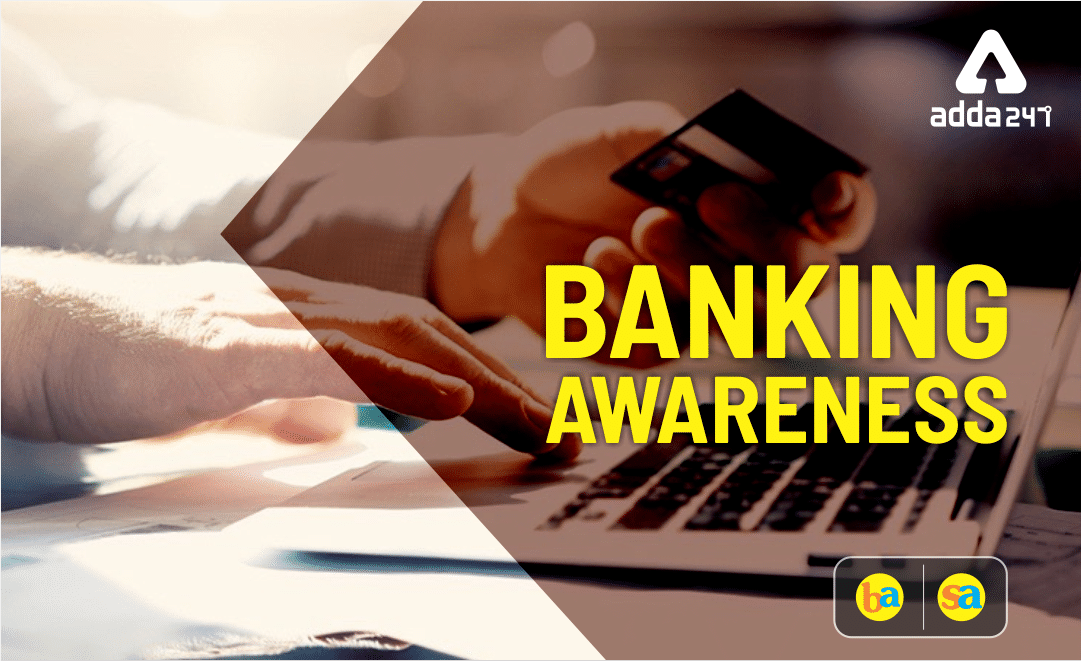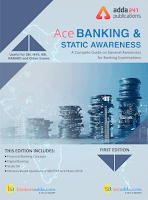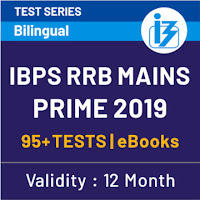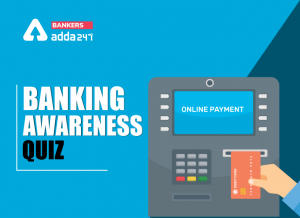Dear Aspirants,
IBPS RRB PO/Clerk Main Banking Awareness Quiz
With the increased competition in the field of banking examinations, it has now become very important to cover up all the sections efficiently. One subject that can help you bagging graceful marks in the minimum time in these examinations is Banking Awareness. Banking Awareness Quiz not only helps you deal with the General Awareness Section of Banking Exams but also, the Personal Interview round of Banking Recruitment.
Q1. A savings as well as current account should be treated as inactive if there are no transactions in the account for over a period of _____ months.
(a) 24 months
(b) 30 months
(c) 12 months
(d) 06 months
(e) 36 months
S1. Ans.(c)
Sol. If you have a current or a savings bank account and have not done any transactions through it for more than 12 months, then it will be classified as an inactive account. And if you don’t do any transactions from a bank account for 24 months, then it will be classified as dormant.
Q2. CDR mechanism is a voluntary non-statutory mechanism under which financial institutions and banks come together to restructure the debt of companies facing financial difficulties due to internal or external factors, in order to provide timely support to such companies. What is the meaning of “R” in CDR?
(a) Regulation
(b) Reserve
(c) Restructuring
(d) Ratio
(e) Reduce
S2. Ans.(c)
Sol. Corporate Debt Restructuring (CDR) mechanism is a voluntary non statutory mechanism under which financial institutions and banks come together to restructure the debt of companies facing financial difficulties due to internal or external factors, in order to provide timely support to such companies.
Q3. What is the minimum amount required to open a Fixed Deposit (FD)?
(a) Rs. 1000
(b) Rs. 100
(c) Rs. 500
(d) Rs. 300
(e) No Limit
S3. Ans.(a)
Sol. The minimum deposit required to open an FD varies from banks to banks and ranges between Rs. 1,000 to Rs. 10,000. There is no upper limit. For instance, the minimum amount that can be deposited in State Bank of India is Rs. 1,000.
Q4. If one is not satisfied with the decision passed by the Banking Ombudsman, one can approach the appellate authority to _______.
(a) Governor of RBI
(b) Deputy Governor of the RBI
(c) Finance Secretary
(d) Finance Minister
(e) GM of the Concern Bank
S4. Ans.(b)
Sol. If one is not satisfied with the decision passed by the Banking Ombudsman, one can approach the appellate authority against the Banking Ombudsmen’s decision. Appellate Authority is vested with a Deputy Governor of the RBI.
Q5. Headquarters of National Investment and Infrastructure Fund (NIIF) is located at ________.
(a) New Delhi
(b) Hyderabad
(c) Mumbai
(d) Kolkata
(e) Chennai
S5. Ans.(c)
Sol. National Investment and Infrastructure Fund Limited (NIIFL) is an investor-owned fund manager, anchored by the Government of India (GoI) in collaboration with leading global and domestic institutional investors. The headquarters of NIIF is in Mumbai.
Q6. MSME sector shall be reckoned in computing achievement under the overall Priority Sector target of 40 percent of ANBC. What is the full form of ANBC?
(a) Adjusted Net Bank Core
(b) Adjusted Net Bank Credit
(c) Adjusted Net Bank Cash
(d) Adjusted Net Bank Common
(e) Adjusted Net Bank Current
S6. Ans.(b)
Sol. Advances to Micro, Small and Medium Enterprises (MSME) sector shall be reckoned in computing achievement under the overall Priority Sector target of 40 percent of Adjusted Net Bank Credit (ANBC) or credit equivalent amount of Off-Balance Sheet Exposure, whichever is higher, as per the extant guidelines on priority sector lending.
Q7. _______________ is a situation in which the inflation rate is high, the economic growth rate slows, and unemployment remains steadily high.
(a) Inflation
(b) Deflation
(c) Stagflation
(d) All of the above
(e) None of the above
S7. Ans.(c)
Sol. In economics, stagflation, or recession-inflation, is a situation in which the inflation rate is high, the economic growth rate slows, and unemployment remains steadily high. It presents a dilemma for economic policy, since actions intended to lower inflation may exacerbate unemployment, and vice versa.
Q8. Which bank has become the first private sector bank to sell Indian gold coins?
(a) Dhanlaxmi Bank
(b) Federal Bank
(c) ICICI Bank
(d) IndusInd Bank
(e) Karur Vysya Bank
S8. Ans.(b)
Sol. Kerala based private sector lender, Federal Bank has tied up with MMTC Ltd. for distribution of Indian Gold Coins (IGC), the first-Ever national gold offering by the government, which was launched by Prime Minister Narendra Modi In November 2015.
Q9. Which of the following can invest in the commercial paper?
(a) Corporate
(b) Primary Dealers
(c) All-India Financial Institutions
(d) Both (b) and (c)
(e) All of the Above
S9. Ans.(e)
Sol. Individuals, banking companies, other corporate bodies (registered or incorporated in India) and unincorporated bodies, non-resident Indians and foreign institutional investors etc can invest in CPs.
Q10. Section 80E of the Income Tax Act provides for deduction of interest paid on Education or study loan is taken for higher education. Deduction under section 80E is available for _____
(a) 2 years
(b) 4 years
(c) 8 years
(d) 10 years
(e) None of the given options is true
S10. Ans.(c)
Sol. The deduction on education can be claimed only when you start the repayment and is available up to eight years, or until the payment of interest in full, whichever is earlier. This means, if you repay the loan within, say, five years, you can claim deduction only till such period.
Q11. What is the full form of FCCB?
(a) Foreign Currency Convertible Bond
(b) Foreign Currency credit Bond
(c) Financial Consortium and Credit Bureau
(d) Future Credit and Currency Bureau
(e) None of the given options is true
S11. Ans.(a)
Sol. A foreign currency convertible bond (FCCB) is a type of convertible bond issued in a currency different than the issuer’s domestic currency. In other words, the money being raised by the issuing company is in the form of foreign currency. A convertible bond is a mix between a debt and equity instrument.
Q12. Which of the following institutions is responsible for the supervision of RRBs?
(a) RBI
(b) SEBI
(c) NABARD
(d) GOI
(e) All of the above
S12. Ans.(c)
Sol. NABARD is responsible for regulating and supervising the functions of Co-operative banks and RRBs. In this direction, the Institutional Development Department of NABARD has been taking several initiatives in association with the Government of India and RBI to improve the health of Co-operative banks and Regional Rural Banks.
Q13. With which article of the Indian Constitution is Money Bill related?
(a) Article 110
(b) Article 109
(c) Article 108
(d) Article 107
(e) None of the given options is true
S13. Ans.(a)
Sol. Article 110(3) of the Constitution of India categorically states that ‘if any question arises whether a Bill is a Money Bill or not.
Q14. RBS Bank has been headquartered in-?
(a) Glasgow, United Kingdom
(b) Edinburgh, United Kingdom
(c) Skye, United Kingdom
(d) Aberdeen, United Kingdom
(e) None of the given options is true
S14. Ans.(b)
Sol. The Royal Bank of Scotland, commonly abbreviated as RBS, is one of the retail banking subsidiaries of The Royal Bank of Scotland Group plc, together with NatWest and Ulster Bank. Headquarters of RBS is in Edinburgh, United Kingdom.
Q15. National Housing Bank (NHB), a wholly-owned subsidiary of _________
(a) RBI
(b) Government of India
(c) IRDAI
(d) State Government
(e) SEBI
S15. Ans.(b)
Sol. The National Housing Bank (NHB), once a wholly-owned subsidiary of Reserve Bank of India (RBI), has now been taken over by the government. The taking over of the Bank has been notified by the government after buying complete stake for Rs 1,450 crore from the central bank.
Study Daily Banking Awareness on Adda247 YouTube Channel, check the video below:




 Banking Awareness Quiz for Bank Exam: 30...
Banking Awareness Quiz for Bank Exam: 30...



